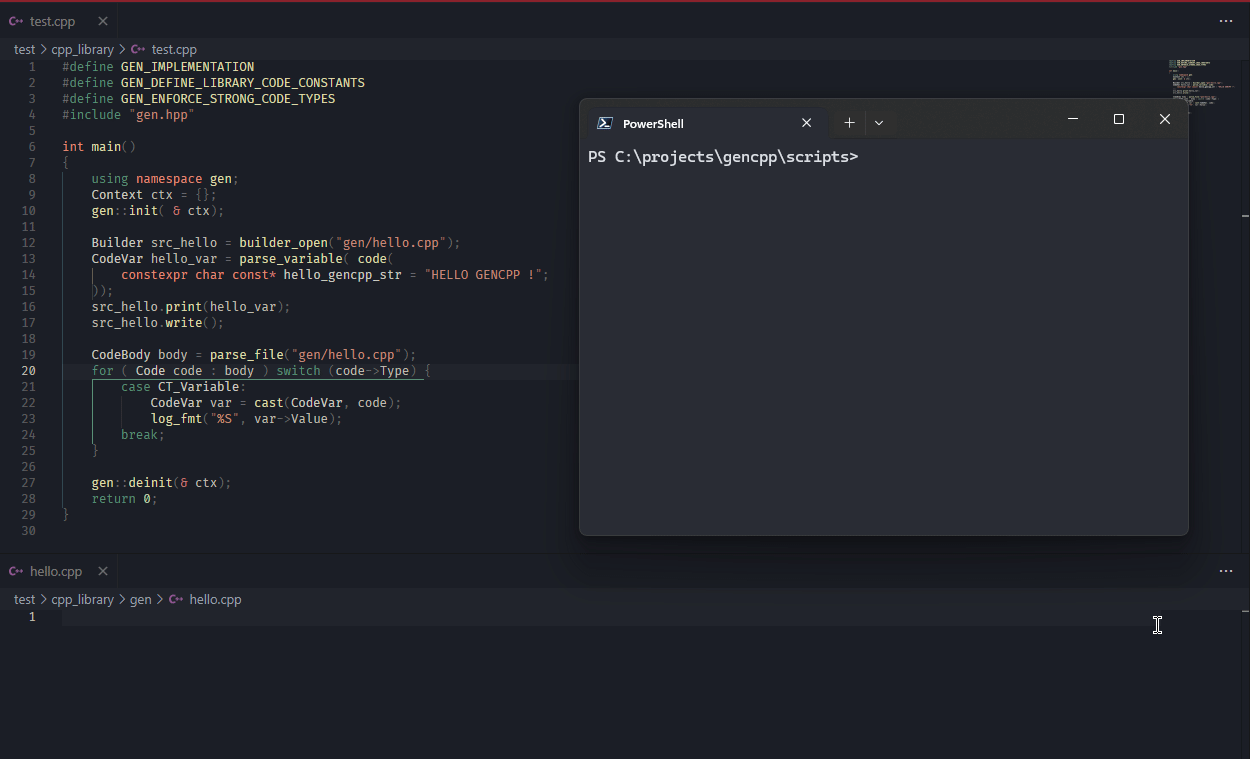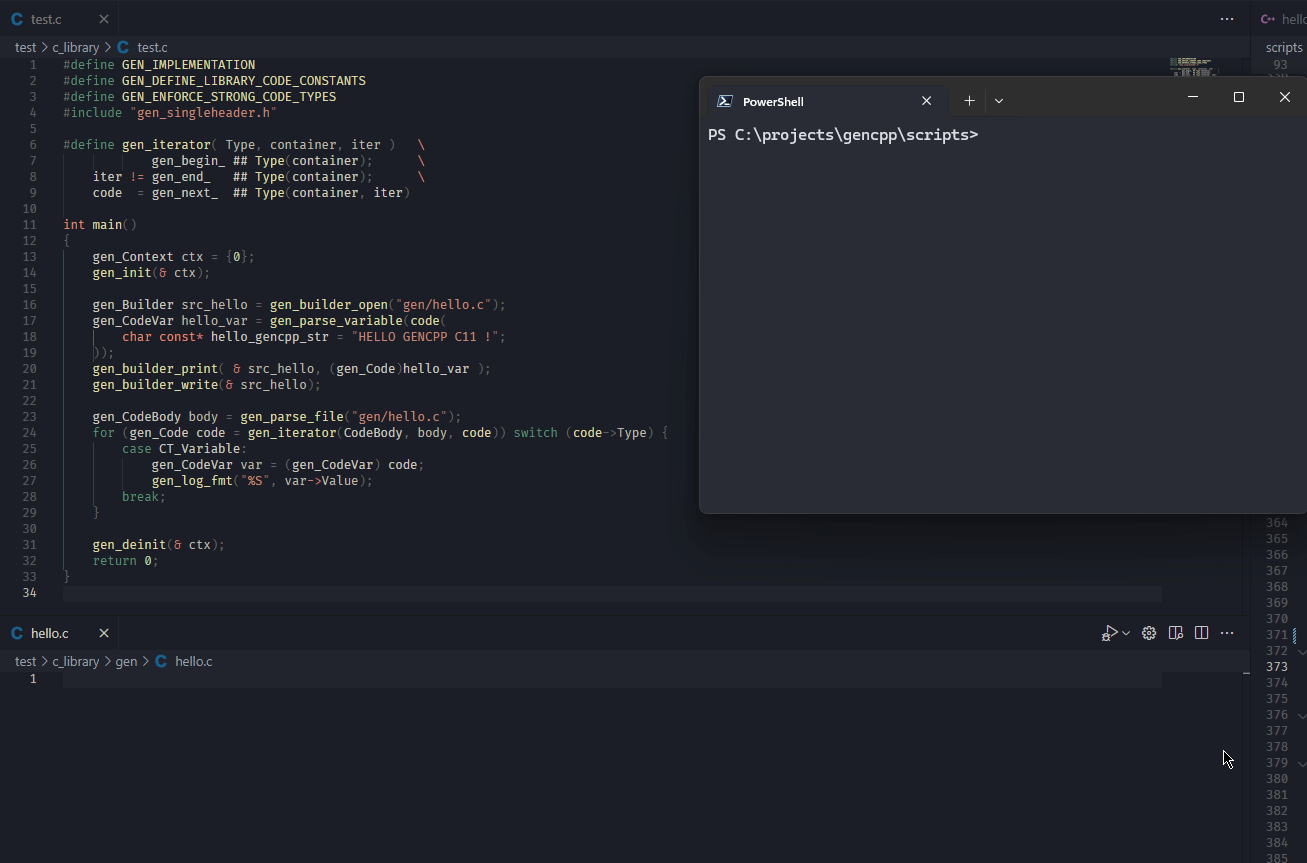gencpp
An attempt at simple staged metaprogramming for C/C++. Reflect and generate code for your codebase at runtime!
The library API is a composition of code element constructors, and a non-standards-compliant single-pass C/C++ parser.
These build up a code AST to then serialize with a file builder, or can be traversed for staged-reflection of C/C++ code.
This code base attempts follow the handmade philosophy.
Its not meant to be a black box metaprogramming utility, it should be easy to integrate into a user's project domain.
Documentation
- docs - General: Overview and additional docs
- AST_Design: Overview of ASTs
- AST Types: Listing of all AST types along with their Code type interface.
- Parsing: Overview of the parsing interface.
- Parser Algo: In-depth breakdown of the parser's implementation.
- base: Essential (base) library.
- gen_c_library: C11 library variant generation (single header and segmented).
- gen_segmented: Segmented C++ (
gen.<hpp/cpp>,gen.dep.<hpp/cpp>) generation - gen_singleheader: Singlehader C++ generation
gen.hpp - gen_unreal_engine: Unreal Engine thirdparty code generation.
Notes
This project is still in development (very much an alpha state), so expect bugs and missing features.
See issues for a list of known bugs or todos.
The library can already be used to generate code just fine, but the parser is where the most work is needed. If your C++ isn't "down to earth" expect issues.
A natvis and natstepfilter are provided in the scripts directory (its outdated, I'll update this readme when its not).
Minor update: I've been using RAD Debugger with this and the code structures should be easy to debug even without natvis.
Usage
A metaprogram is built to generate files before the main program is built. We'll term runtime for this program as GEN_TIME. The metaprogram's core implementation are within gen.hpp and gen.cpp in the project directory.
gen.cpp `s main() is defined as gen_main() which the user will have to define once for their program. There they may reflect and/or generate code.
In order to keep the locality of this code within the same files the following pattern may be used (although this pattern isn't the best to use):
Within program.cpp :
#ifdef GEN_TIME
#include "gen.hpp"
...
u32 gen_main()
{
gen::Context ctx;
gen::init(& ctx);
...
gen::deinit(& ctx);
return 0;
}
#endif
// "Stage" agnostic code.
#ifndef GEN_TIME
#include "program.gen.cpp"
// Regular runtime dependent on the generated code here.
#endif
The design uses a constructive builder API for the code to generate.
The user is provided Code objects that are used to build up the AST.
Example using each construction interface:
Upfront
Validation and construction through a functional interface.
CodeTypename t_uw = def_type( name(usize) );
CodeTypename t_allocator = def_type( name(allocator) );
CodeTypename t_string_const = def_type( name(char), def_specifiers( args( ESpecifier::Const, ESpecifier::Ptr ) ));
CodeStruct header;
{
CodeVar num = def_variable( t_uw, name(Num) );
CodeVar cap = def_variable( t_uw, name(Capacity) );
CodeVar mem_alloc = def_variable( t_allocator, name(Allocator) );
CodeBody body = def_struct_body( args( num, cap, mem_alloc ) );
header = def_struct( name(ArrayHeader), { body });
}
Parse
Validation through ast construction.
CodeStruct header = parse_struct( code(
struct ArrayHeader
{
usize Num;
usize Capacity;
allocator Allocator;
};
));
Untyped
No validation, just glorified text injection.
Code header = code_str(
struct ArrayHeader
{
usize Num;
usize Capacity;
allocator Allocator;
};
);
name is a helper macro for providing a string literal with its size, intended for the name parameter of functions.
code is a helper macro for providing a string literal with its size, but intended for code string parameters.
args is a helper macro for providing the number of arguments to varadic constructors.
code_str is a helper macro for writing untyped_str( code( <content> ))
All three construction interfaces will generate the following C code:
struct ArrayHeader
{
usize Num;
usize Capacity;
allocator Allocator;
};
Note: The formatting shown here is not how it will look. For your desired formatting its recommended to run a pass through the files with an auto-formatter.
(The library currently uses clang-format for formatting, beware its pretty slow...)
Building
See the scripts directory.
Gallery
Listing definitions in the Cuik Compiler
https://github.com/user-attachments/assets/2302240c-01f1-4e1b-a4b5-292eb3186648
Unreal: Generating a UAttributeSet from a UDataTable
https://github.com/user-attachments/assets/2a07b743-825d-4f9f-beaf-3559e8748a4d

